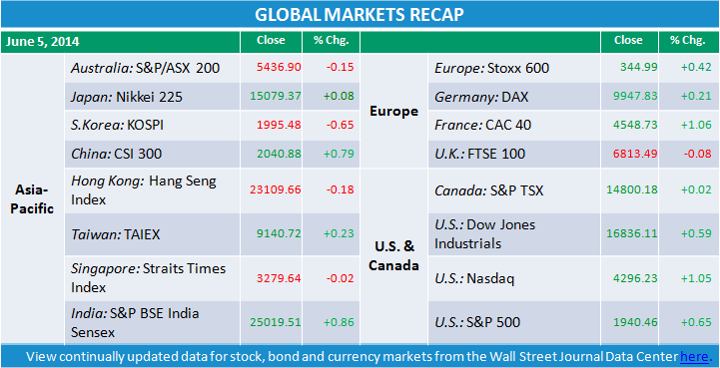Sent from my Verizon Wireless BlackBerry
From: "CFA Institute Financial NewsBrief: Asia Pacific Edition" <cfa_ap@smartbrief.com>
Date: Thu, 5 Jun 2014 17:36:52 -0500 (CDT)
To: <mainandwall@yahoo.com>
Subject: ECB goes negative, launches other measures to avert deflation

| | | | | |
ECB goes negative, launches other measures to avert deflation A negative deposit rate of 0.1%, an asset-purchase plan and a €400 billion liquidity channel tied to bank lending are all part of a European Central Bank package designed to avert the threat of deflation in the eurozone. ECB President Mario Draghi said in announcing the measures Thursday that the bank isn't finished, indicating further measures may be in store if needed. Bloomberg (6/5) ECB move diverges from tightening at other central banks The European Central Bank's major moves Thursday to boost liquidity mark a split with its counterparts in the U.S., where the Federal Reserve is steadily reducing its bond buying, and the U.K., where the Bank of England is expected to move up its schedule for a rate boost. The divide is only expected to grow, creating profitable new avenues for investors. Bloomberg (6/5) U.S. Fed Beige Book reports widespread moderate growth Modest to moderate growth was reported in all 12 U.S. Federal Reserve districts in the Fed's latest Beige Book report. Consumer spending was also up in all districts while price pressures remained low, although the real estate market was reported "mixed." CNBC (6/4) As G-7 threatens Russia over Ukraine, Japan calls for better relations Japan separated itself a bit from the Group of Seven's threat of further sanctions on Russia over the situation in Ukraine, with Prime Minister Shinzo Abe saying Tokyo hoped to maintain healthy relations with Moscow. "I want Russia to be involved in various issues concerning the international community in a constructive manner," Abe said, extending Japan's greater opening to Russia under his government. Reuters (6/5)  | Director, Curriculum Projects
Head Education, APAC
| | | | | U.S. prepares palette of new rules for transparency, high-speed trading The head of the U.S. Securities and Exchange Commission is planning a wide range of measures aimed at promoting market transparency and fairness. Mary Jo White's proposals include an "anti-disruptive trading" rule to curb some aggressive short-term tactics by high-frequency traders and a plan to open the books of proprietary trading shops. Reuters (6/5) Australia central bank sees no reason to rein in real estate lending Citing the mixed record of earlier attempts at wide-ranging policies to curb higher-risk lending in Australia's housing market, a central bank official said the bank sees no need to follow others worldwide down that path. "The rationale for carving out particular bits of the prudential framework under separate governance ... appears to be that supervisors cannot be relied on to discharge their duties with system-level concerns in mind," said Luci Ellis, head of financial stability at the bank. The Sydney Morning Herald (Australia) (6/5) | | Economic Trends & Outlook | German factory orders swing to strong positive growth With a boost from exports, German factory orders jumped 3.1% in April, more than reversing a surprising 2.8% decline in March and providing a bit of positive news for the eurozone. "We see fairly balanced, robust growth in Germany at the moment," said Alexander Koch, an economist at Raiffeisen Schweiz in Zurich. "There is volatility in the monthly data, but everything points toward ongoing expansion this year." Bloomberg (6/5) Average of Americans seeking jobless benefits at 7-year low A closely watched four-week moving average of Americans applying for initial unemployment benefits fell to a seven-year low of 310,250 at the end of May. The average points to a labor market that is "heading in the right direction," said Ryan Sweet, a senior economist at Moody's Analytics. "The unemployment rate has come down pretty quickly over the last several months, and that may be lifting consumer spirits." Bloomberg (6/5) U.S. consumer gauge takes a positive turn With a strong gain in U.S. consumer assessment of the economic climate for spending, the Bloomberg Consumer Comfort Index rose this week to 35.1 from 33.3 a week earlier for its first rise in five weeks. An improving stock market and job outlook also lifted the overall result. "Sentiment is hanging in there as Americans grow more confident about their financial conditions," said Joseph Brusuelas, a Bloomberg senior economist. Bloomberg (6/5) South Korea gross national income barely advances in Q1 Growth in South Korea's gross national income in the first quarter slowed from the quarterly growth rate in the previous three periods. The tepid 0.5% gain is "partly attributed to a fall in net factor income from the rest of the world, led by dividend income," a Bank of Korea official said. Meanwhile, growth in gross national product in the latest quarter registered 0.9%. MK.co.kr (South Korea) (6/5) Australia swings to trade deficit Australia posted a trade deficit of AU$122 million for April, reversing a March surplus of AU$902 million. A rise in imports of both capital and consumer goods accounted for the gap, which surprised economists predicting a AU$300 million surplus. MarketWatch (6/5) | | Capital Markets & Financial Products | China injections drive down money market rate With China's central bank flushing money into the banking system, including 40 billion yuan of 28-day repurchase agreements Thursday, the benchmark money-market rate plunged to its lowest level in nearly a month. In all, this week's injections amount to 73 billion yuan so far, according to data from Bloomberg. Bloomberg (6/5) | Please contact one of our specialists for advertising opportunities, editorial inquiries, job placements, or any other questions.
| Mailing Address:
SmartBrief, Inc.®, 555 11th ST NW, Suite 600, Washington, DC 20004 | | | | | |




No comments:
Post a Comment